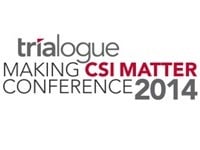
Top stories






More news


Marketing & Media
Ads are coming to AI. Does that really have to be such a bad thing?














The panel comprised Nqobile Dlamini, Citizenship Lead at Microsoft SA, Charles Reed Head of Community Investment, Barclays Africa and David Torres, Secretary and Business Development Director of mother2mothers, a social enterprise founded in Cape Town that trains, employs and empowers mothers living with HIV, as mentor mothers who assist doctors and nurses in understaffed health centres. They help other HIV-positive mothers on how they can protect their babies from HIV infection and keep themselves and their families healthy.
For Microsoft, the big focus in Africa is the youth. "Africa is the fastest growing region in the world, but the majority of its population is under 25 years of age. How can we empower these young people with the technology skills to be innovative in solving the problems of Africa?" asked Dlamini. In Africa, the company has three focus areas: innovation, access and world class skills.
Barclays Africa also focuses on the continent's youth (aged 15 to 35) through enterprise development skills with a strong preference on the supply and demand side. Reed explains that this is the linking of an initiative with an opportunity. "Job placement is important and the bank has a global and African programme aimed at the youth."
Microsoft has been in Africa for 20 years and so it has experienced much growth and learning in the CSI space on the continent. The number one lesson learnt for them is the assumption that many companies make when they think of Africa. "They assume that they can duplicate their CSI programmes across the continent," says Dlamini. "This does not work. You can have the same strategy, but how it is delivered on the ground will be different."
When you look at the social issues that CSI is trying to address, at a certain level most of the problems are similar says Torres. "For mothers2mothers, pregnant women and mothers with HIV face the same problems and the same resources are needed whether they are in Cape Town or Lagos."
However their model is still tailored to local context. "This means we might be engaging with the ministries of health in all countries on the primary context which is mother-to-child HIV, but the secondary context could vary according to local relevance. For example in South Africa the secondary context is TB, while in another country it might be Malaria."
The biggest challenge Microsoft has encountered is the difficulty to scale up programmes. "If you are implementing a programme across different countries it is not easy to scale impact so it is critical in terms of how you manage your implementation. The visibility of what you are doing is also not always there and it impacts on scale capacity. If everyone knows your story it is easier to scale and build capacity," says Dlamini.
Reed echoes her sentiments. "Managing people over geographies and communicating and dealing with people over wide spaces is challenging even for a multinational organisation such as Barclays that is decentralised and does local."
This is another issue to be aware of says Torres, explaining that while some of the countries they are operating in might not have local governance and compliance in place, mother2mothers still follows certain governance and compliance because it answers to global stakeholders.
"Some markets, for example Ghana, do have certain requirements, while others at least expect you to invest back into the country or have the expectation that you contribute a percentage of profit, for example Egypt has these guidelines in their laws."
He also feels that companies should follow governance and compliance obligations in any country regardless of rules or not.
Investing for the right reasons is important. Barclays Africa invests for the greatest impact and does not expect a commercial return. "You must have a purpose and be clear and bold around what you're doing. Big organisations must understand the communities they serve," says Reed, adding that you have to take a long-term view. "Relevance and close alignment to your purpose is important. Language is a consideration. Leverage your staff and physical presence. Look for political stability and infrastructure."
Before mothers2mothers enters into a country, it does comprehensive research. "We look at how we can be effective, what funding availability is there, what advocacy partners are there, is there infrastructure in place, etc. Going into a country might start with a need, but there has to be an infrastructure that allows us to be effective," says Torres.
There is a lot of economic growth expected in Africa over next few years and we need to start thinking about how we get NGOs to think like businesses and move away from aid type organisations, according to Dlamini. "Right now we are focused on Public Private Partnerships (PPP), but we believe that over the next five to 10 years the trend will be close collaboration between corporates to leverage each other's strengths."
